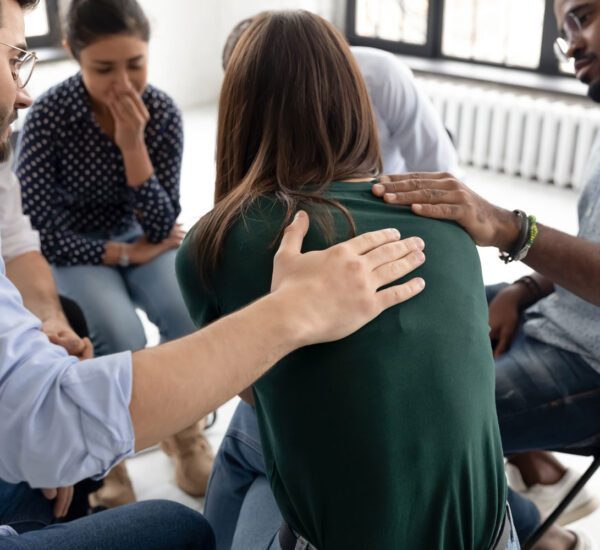THERAPIES
Substance Abuse Group Therapy
Group therapy has long been a staple of substance use treatment.[1] Our natural propensity as human beings to congregate and relate to one another’s experiences makes group therapy a powerful therapeutic tool for treating substance abuse issues—a tool that can be as helpful as individual therapy and sometimes even more successful.[2]
What is Group Therapy?
Group therapy is a form of psychotherapy in which one or more trained therapists facilitates a therapeutic session with a small group of individuals who share similar concerns. Typically, group size ranges from 6-12, depending on the type of program.
Group therapy participants can share their thoughts, feelings, and experiences within the group, providing a safe and supportive environment to process and gain new insights. The therapist’s role is to guide and facilitate the discussions, encouraging effective and respectful communication between members. They will also provide psychoeducation and support for attendees.
Group therapy has been widely studied as an effective treatment modality for several challenges, including:
- Depression and mood disorders
- Relationship issues
- Grief and loss
- Anxiety disorders
- Stress management
- Social skills development
- Eating disorders
- Substance abuse and addiction concerns
Do you or someone you know need Group Therapy? Reach out today.
Group Therapy for Substance Abuse and Addiction
Professionals employ a wide array of group therapy modalities and techniques for substance abuse and addiction concerns. These methods are intended to help attendees to feel less isolation and stigma, bear witness to one another’s ongoing recovery work, and address their own challenges or co-occurring issues.[3]
Therapy groups for substance use and addiction can be open, and new members can join at any time. Closed groups are where all members begin at the same time and complete the process as a unit. Both types are frequently offered within the community and as a component of treatment at many reputable addiction treatment centers.
Confidentiality is an important part of group therapy, and all attendees are advised to keep the information shared confidentially with the group. Of course, confidentiality carries no guarantees, as it involves sharing your personal information with others. However, groups work best where there is open and honest communication. Most attendees view their fellow group members as trusted confidants and sources of information.[4]

Substance Abuse Group Therapy Activities
The therapeutic activities of a substance abuse therapy group can vary widely, depending on the nature and focus of the group. Some common activities for substance use group therapy may include:
- Psychoeducation around addiction topics and recovery principles
- Skills development
- Identifying triggers for usage
- Role-playing
- Group activities (which can be communication or activity-based)
- Exploration of usage history
- Relapse prevention planning
- Problem-solving
Addiction group therapy has been widely studied and shown to provide comfort and a social aspect to addiction treatment. This helps participants to feel less alone in their recovery journeys.[5]

How (and Why) Substance Abuse Group Therapy Works
Substance abuse group therapy is a highly effective and evidence-based approach to helping individuals overcome addiction.[6] The group dynamic provides a unique opportunity to learn from peers, exchange coping strategies, and offer mutual encouragement, creating a powerful sense of camaraderie and accountability around the process.
The therapeutic setting allows participants to explore the underlying causes of their addiction, identify triggers and patterns, and develop healthier coping mechanisms for their daily lives. Moreover, witnessing the progress of others in the group serves as motivation and inspiration for one’s own recovery journey.
There is a growing body of evidence that group therapy is also more cost-effective and produces client outcomes that compare favorably to individual therapy with regard to substance use and addiction treatment acceptance, retention, reductions in usage, and psychological symptoms of distress.[7] Group therapy is also flexible, with several different adaptations that can be incorporated across several treatment environments.[8]

What’s the Best Way to Find Group Therapy for Addiction?
There are several ways to identify quality group therapy treatment for addictions and substance use within the community:
- Speak to your doctor or a healthcare professional about a referral
- Call the SAMHSA National Helpline for treatment referrals in your area
- Contact 988 for a list of resources in your area
- Check to see if your city, county, or state has a list of providers in the area
Additionally, most treatment facilities which offer substance use disorder and addiction treatment will include group therapy as part of their programming.

What We Treat with Group Therapy
Cost of Group Therapy for Substance Abuse
The cost of attending group therapy can vary, depending on where you are accessing care, if it is part of a complete treatment program, and your individual needs. It’s important that you feel empowered to make the best decisions for your care, along with inquiring as to any potential financial costs. For many patients, there are options for insurance coverage and payment plans.
Benefits of Group Therapy for Addiction
Group therapy can be uniquely beneficial for individuals struggling with addiction, particularly when combined with other treatment interventions as part of a structured program.

Support and understanding
Addiction group therapy provides a safe, supportive environment where individuals with similar experiences can share and process their struggles, successes, and setbacks, which often leads participants to feel more understood and less alone.
Reduction in isolation and shame
Oftentimes, substance use and process or behavioral addiction lead to feelings of isolation and shame, which group therapy can help to mitigate by fostering a sense of connection with a group of peers experiencing similar concerns.
Learning opportunities
Attendees are able to learn from one another’s experiences as to how they’ve overcome obstacles in their lives, which can inspire the creation of new insights toward change.
Accountability
Participation in addiction group therapy can also motivate members to be more accountable for their actions, bearing witness to and supporting others who are attempting to do the same.
Cultivating empathy and compassion
The group setting is conducive to helping members feel more compassionate towards others (and towards themselves) in their struggles, helping to grow their understanding and develop more resilience and emotional intelligence.
Relapse prevention
Many addiction groups help individuals identify their patterns and triggers to use, developing more awareness around their temptations and assisting to create new coping strategies to more effectively deal with them as they arise.
We’re Glad You’re Here! Take The First Step In Recovery Today.
We’re eager to meet you and help you succeed in your recovery journey. Contact us today to start now.